| Listing 1 - 10 of 15 | << page >> |
Sort by
|
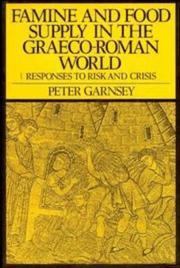
ISBN: 0521351987 0521375851 0511097352 0511583826 9780521351980 9780511583827 9780521375856 Year: 1988 Publisher: Cambridge: Cambridge university press,
Abstract | Keywords | Export | Availability | Bookmark
 Loading...
Loading...Choose an application
- Reference Manager
- EndNote
- RefWorks (Direct export to RefWorks)
The first full-length study of famine in antiquity. The study provides detailed case studies of Athens and Rome, the best known states of antiquity, but also illuminates the institutional response to food crisis in the mass of ordinary cities in the Mediterranean world. Ancient historians have generally shown little interest in investigating the material base of the unique civilisations of the Graeco-Roman world, and have left unexplored the role of the food supply in framing the central institutions and practices of ancient society.
Food supply --- Famines --- Aliments --- History --- Approvisionnement --- Histoire --- -Famines --- -Food supply --- -Food control --- Produce trade --- Agriculture --- Food security --- Single cell proteins --- Famine --- Starvation --- -History --- Food control --- Greece --- Rome --- History. --- Arts and Humanities --- Food supply - Greece - History - To 1500. --- Food supply - Rome. --- Famines - Greece - History - To 1500. --- Famines - Rome.
Book
ISBN: 0198251947 Year: 1970 Publisher: Oxford : Clarendon,
Abstract | Keywords | Export | Availability | Bookmark
 Loading...
Loading...Choose an application
- Reference Manager
- EndNote
- RefWorks (Direct export to RefWorks)
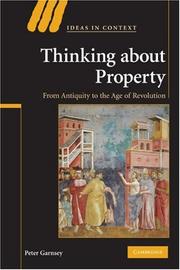
ISBN: 9780521700238 9780521876773 052170023X 052187677X 9780511482786 9780511379017 0511379013 9780511376313 0511376316 0511482787 110718276X 128124354X 9786611243548 0511378122 0511377258 0511374771 Year: 2007 Volume: 90 Publisher: Cambridge : Cambridge University Press,
Abstract | Keywords | Export | Availability | Bookmark
 Loading...
Loading...Choose an application
- Reference Manager
- EndNote
- RefWorks (Direct export to RefWorks)
This book explores ancient 'foundational' texts relating to property and their reception by later thinkers in their various contexts up to the early nineteenth century. The texts include Plato's vision of an ideal polity in the Republic, Jesus' teachings on renunciation and poverty, and Golden Age narratives and other evolutionary accounts of the transition of mankind from primeval communality to regimes of ownership. The issue of the legitimacy of private ownership exercises the minds of the major political thinkers as well as theologians and jurists throughout the ages. The book gives full consideration to the historical development of Rights Theory, with special reference to the right to property. It ends with a comparative study of the Declarations of Rights in the American and French Revolutions and seeks to explain, with reference to contemporary documents, why the French recognised an inalienable, human right to property whereas the Americans did not.
Right of property --- Property --- Personal property. --- Personal property --- Droit de propriété --- Propriété --- Propriété mobilière --- History. --- Philosophy --- Religious aspects. --- Moral and ethical aspects. --- Histoire --- Philosophie --- Aspect religieux --- Aspect moral --- History --- Religious aspects --- Moral and ethical aspects --- Droit de propriété --- Propriété --- Propriété mobilière --- Ownership of property --- Private ownership of property, Right of --- Private property, Right of --- Property, Right of --- Property rights --- Right of private ownership of property --- Right of private property --- Right to property --- Chattels --- Choses --- Personalty --- Property, Personal --- Philosophy&delete& --- Law and legislation --- Moral and religious aspects --- Civil rights --- Economics --- Possession (Law) --- Things (Law) --- Wealth --- Primitive property --- Arts and Humanities --- Right of property - History --- Property - Philosophy - History --- Property - Religious aspects --- Personal property - Moral and ethical aspects
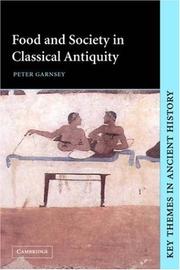
ISBN: 9780521645881 0521645883 0521641829 9780521641821 9780511612534 051117330X 0511066228 0511059914 0511324960 0511612532 1280420421 1139145967 0511068352 1107116260 9780511066221 9780511068355 9780511059919 6610420424 9786610420421 9781280420429 9781139145961 9780511173301 9780511324963 9781107116269 Year: 1999 Publisher: Cambridge, U.K. ; New York : Cambridge University Press,
Abstract | Keywords | Export | Availability | Bookmark
 Loading...
Loading...Choose an application
- Reference Manager
- EndNote
- RefWorks (Direct export to RefWorks)
This is the first study of food in classical antiquity that treats it as both a biological and a cultural phenomenon. The variables of food quantity, quality and availability, and the impact of disease, are evaluated and a judgement reached which inclines to pessimism. Food is also a symbol, evoking other basic human needs and desires, especially sex, and performing social and cultural roles which can be either integrative or divisive. The book explores food taboos in Greek, Roman, and Jewish society, and food-allocation within the family, as well as more familiar cultural and economic polarities which are highlighted by food and eating. The author draws on a wide range of evidence new and old, from written sources to human skeletal remains, and uses both comparative historical evidence from early modern and contemporary developing societies and the anthropological literature, to create a case-study of food in antiquity.
Civilization, Classical --- Food habits --- Food supply --- 394.12093 --- Food control --- Produce trade --- Agriculture --- Food security --- Single cell proteins --- Eating --- Food customs --- Foodways --- Human beings --- Habit --- Manners and customs --- Diet --- Nutrition --- Oral habits --- Classical civilization --- Civilization, Ancient --- Classicism --- History --- Social sciences Food Ancient World --- Arts and Humanities --- Civilization, Classical. --- Habitudes alimentaires --- Aliments --- Civilisation ancienne --- History. --- Histoire --- Approvisionnement --- Greece --- Rome --- Civilization [Classical ] --- Food habits - Greece - History - To 1500 --- Food habits - Rome --- Food supply - Greece - History - To 1500 --- Food supply - Rome
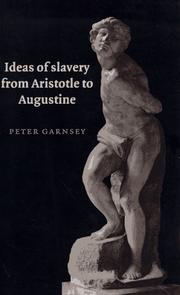
ISBN: 0521574331 052157403X 9780521574334 9780521574037 Year: 1997 Publisher: Cambridge: Cambridge university press,
Abstract | Keywords | Export | Availability | Bookmark
 Loading...
Loading...Choose an application
- Reference Manager
- EndNote
- RefWorks (Direct export to RefWorks)
Slavery and the church --- Slavery in literature --- Slavery --- Abolition of slavery --- Antislavery --- Enslavement --- Mui tsai --- Ownership of slaves --- Servitude --- Slave keeping --- Slave system --- Slaveholding --- Thralldom --- Crimes against humanity --- Serfdom --- Slaveholders --- Slaves --- Slavery and slaves in literature --- Slaves in literature --- Church and slavery --- Church --- History --- Public opinion&delete& --- Slavery in literature. --- Public opinion --- History. --- Esclavage --- Esclavage et l'Eglise --- Histoire --- Slavery - Public opinion - History. --- Slavery in literature - History. --- Slavery and the church - History. --- #GOSA:II.P.AM.M --- #GOSA:II.P.AU.3 --- #GOSA:II.P.Jud.PhiA.M --- #GOSA:V.Oud.Ari.M --- Enslaved persons in literature --- Enslaved persons --- Esclaves --- Dans la littérature --- Aspect religieux --- Christianisme --- Opinion publique
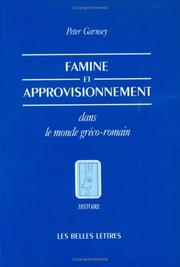
ISBN: 2251380329 9782251380322 Year: 1996 Publisher: Paris: Les Belles Lettres,
Abstract | Keywords | Export | Availability | Bookmark
 Loading...
Loading...Choose an application
- Reference Manager
- EndNote
- RefWorks (Direct export to RefWorks)
Famines --- Food supply --- Aliments --- History --- Rome --- Histoire --- Approvisionnement --- Greece --- Grèce --- Economic conditions --- Conditions économiques --- Grèce --- Conditions économiques --- History. --- Histoire économique --- VIe s. av JC-VIe s., 600 av JC-600
Book
ISBN: 2251380620 9782251380629 Year: 2004 Volume: 62 Publisher: Paris: Les Belles Lettres,
Abstract | Keywords | Export | Availability | Bookmark
 Loading...
Loading...Choose an application
- Reference Manager
- EndNote
- RefWorks (Direct export to RefWorks)
Propose une synthèse des discours des grands auteurs grecs et romains sur l'esclavage. Les sources écrites ici étudiées montrent que celui-ci n'était pas admis par principe, ni tenu pour un acquis indiscutable, et souleva des questions, sans pourtant provoquer l'émergence d'un mouvement abolitionniste ou d'une controverse publique.
Slavery in literature --- Slavery --- Esclavage dans la littérature --- Esclavage --- Religious aspects --- History --- Public opinion --- Aspect religieux --- Histoire --- Opinion publique --- esclavage - théorie --- Antiquité gréco-romaine. --- Aspect religieux. --- Esclavage. --- Histoire. --- Opinion publique. --- Philosophie. --- Justification --- Aristote --- Augustin (saint) --- Litterature --- Philosophie --- Grèce antique. --- Rome antique. --- Esclavage dans la littérature --- History. --- Grèce --- Antiquité
Book
ISBN: 9782251381183 225138118X Year: 2013 Volume: 118 Publisher: Paris: Les Belles Lettres,
Abstract | Keywords | Export | Availability | Bookmark
 Loading...
Loading...Choose an application
- Reference Manager
- EndNote
- RefWorks (Direct export to RefWorks)
La question de la légitimité de la propriété privée fut à l'origine des débats passionnés entre philosophes, théoriciens de la politique, juristes et théologiens à travers les âges. Dans ce livre, Peter Garnsey étudie les textes, les métaphores, les mythes et les configurations narratives qui jouèrent un rôle fondamental dans l'histoire des conceptions de la propriété, ainsi que leur réception de l'Antiquité jusqu'au début du XIXe siècle.À une époque où se révèle chaque jour un peu plus l'ampleur des destructions que trente années de néolibéralisme ont infligées au corps social, il n'est peut-être pas inutile de rappeler que le droit à la propriété est une construction historique qui cache mal les intérêts des classes ou des institutions qui le proclamèrent naturel, et que la richesse et la propriété sont apparues à de nombreux penseurs de cultures et d'époques très différentes comme un scandale aussi bien moral et politique qu'intellectuel.La présente traduction, réalisée sous le contrôle de l'auteur, offre une version révisée et augmentée de l'ouvrage et peut donc être considérée comme une seconde édition de celui-ci.
Droit de propriété --- Propriété --- Propriété mobilière. --- Propriété mobilière --- Histoire. --- Philosophie --- Aspect religieux. --- Aspect moral. --- Droit de propriété --- Propriété --- Propriété mobilière. --- Propriété mobilière --- Aspect religieux --- Histoire --- Aspect moral
Book
ISBN: 1139054406 Year: 1998 Publisher: Cambridge : Cambridge University Press,
Abstract | Keywords | Export | Availability | Bookmark
 Loading...
Loading...Choose an application
- Reference Manager
- EndNote
- RefWorks (Direct export to RefWorks)
With the publication of Volume 13 The Cambridge Ancient History moves into fresh territory. The first edition was completed by Volume 12 which closed in AD 324. The editors of the new edition have enlarged the scope of Volume 12 to include the foundation of Constantinople and the death of Constantine, and extended the series with two new volumes taking the history down to AD 600. Volume 13 covers the years 337-425, from the death of Constantine to the reign of Theodosius II. It begins with a series of narrative chapters, followed by a part on government and institutions. The economy and society of the Empire are grouped together, as are chapters on foreign relations and the barbarian world. A part on religion marks the importance of Christianity in the Roman Empire by this period. The volume concludes with chapters on the various literary cultures of the Empire, and on art.
Christianity and culture --- History --- Rome --- Mediterranean Region
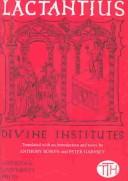
ISBN: 0853239886 1846313449 Year: 2003 Volume: 40 Publisher: Liverpool : Liverpool University Press,
Abstract | Keywords | Export | Availability | Bookmark
 Loading...
Loading...Choose an application
- Reference Manager
- EndNote
- RefWorks (Direct export to RefWorks)
Church history --- Apologetics --- Eglise --- Apologétique --- Sources. --- History --- Histoire --- Sources --- Apologétique
| Listing 1 - 10 of 15 | << page >> |
Sort by
|

 Search
Search Feedback
Feedback About UniCat
About UniCat  Help
Help News
News